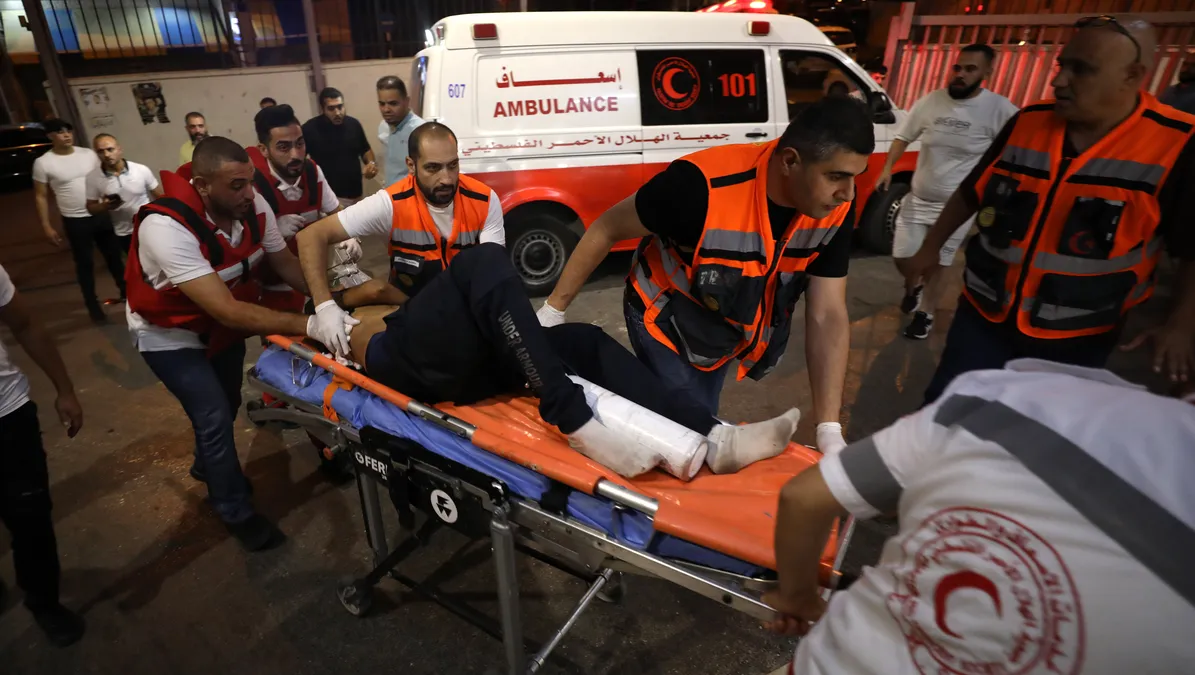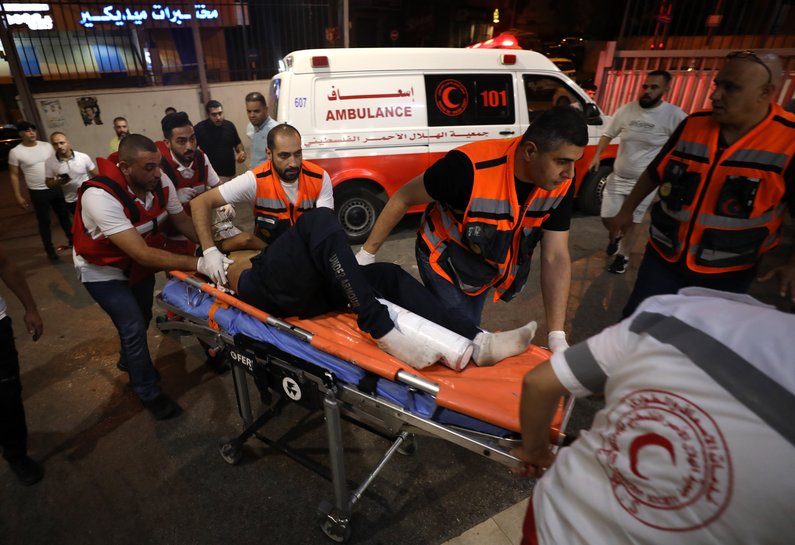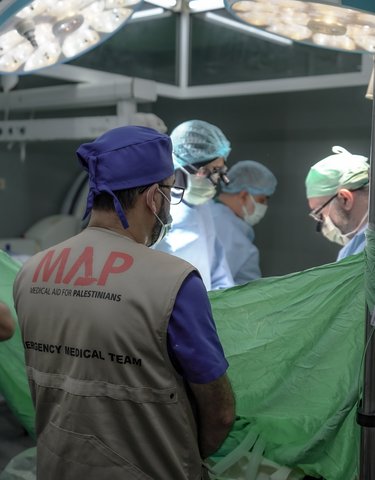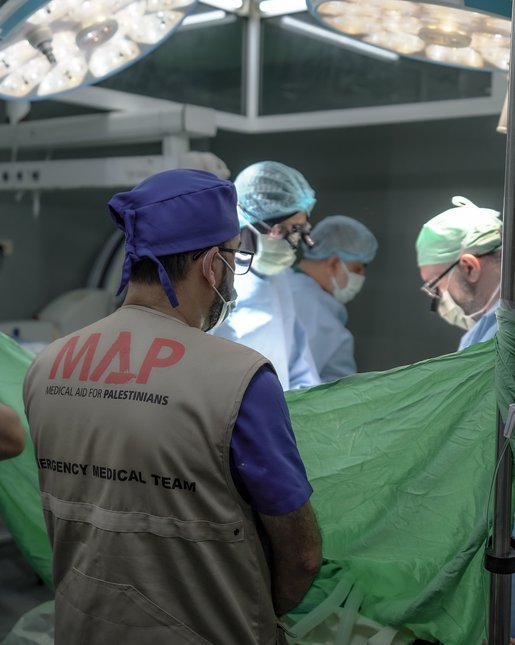How MAP is protecting Palestinian lives amid deepening crises in the West Bank and Gaza
28 September 2023


So far this year, Israeli forces have killed 179 Palestinians in the West Bank, already exceeding last year’s total, and marking the highest number of killings since the UN recording began in 2005.
Recent weeks have seen no let-up in the bloodshed. On 19 September, Israeli forces killed four Palestinians and injured at least 30 more in the latest armed raid on Jenin refugee camp. Among those killed was a 15-year-old boy. A few days later, on 22 September, the Israeli military raided the village of Kafr Dan in Jenin, killing another child – 16-year-old Abdullah Imad Sa’ad Abu Hasan, who became the 39th child to be shot and killed in the West Bank this year.
On 24 September, Israeli forces launched a military incursion on the Nur Shams refugee camp in Tulkarem, killing two Palestinians and using bulldozers to cause extensive damage to streets and infrastructure.
Rampant settler violence is compounding the pressure on Palestinian communities in the West Bank. According to the UN, the rate of settler attacks on property and civilians has spiked from an average of one per day in 2021 to three per day this year – the highest incidence since UN recording began in 2006.
A total of 1,105 people from 28 Palestinian communities have been displaced from their homes since 2022 as a result of settler attacks and obstruction to grazing land, with four communities now completely displaced from their homes.
No healthcare worker is safe
Healthcare workers also continue to face violations as they try to carry out their life-saving work. The Palestine Red Crescent Society (PRCS) have recorded 272 violations against their medical teams so far this year, including violent attacks on their personnel, attacks on ambulances, and cases of obstructed access to the sick and wounded.
During the armed incursion into Nur Shams refugee camp on 24 September, Israeli forces prevented PRCS medical crews from entering the camp and evacuating the injured. During a raid on Beita village in Nablus on 12 September, Israeli forces hit an ambulance with rubber bullets and injured a paramedic.
Responding to the real dangers facing emergency medical personnel, MAP has delivered 20 bulletproof vests and helmets to the PRCS which will be distributed to their teams across the northern West Bank to help protect them from harm.
“MAP is proud to do whatever we can to protect Palestinian healthcare heroes,” said Aisha Mansour, MAP’s West Bank Director. “Nevertheless, seeing paramedics wearing bulletproof vests is a bleak reminder of the international community’s persistent failure to ensure international law is upheld in the occupied Palestinian territory. Palestinian health workers will not be truly safe until impunity for these violations ends.”
MAP’s support for healthcare workers comes as part of our ongoing West Bank emergency response this year, which has included supplying essential medicines, disposables and equipment to hospitals and urgent care centres, providing first aid kits to first responders and volunteers, delivering trauma care training to medical staff and paramedics, and delivering first aid training to communities in hotbeds of attacks.
In response to increasing settler violence and the threat of displacement facing communities in Area C of the West Bank, MAP is also providing ongoing essential primary healthcare services through mobile clinics.
Seeing paramedics wearing bulletproof vests is a bleak reminder of the international community’s persistent failure to ensure international law is upheld in the occupied Palestinian territory.
Gaza’s humanitarian crisis continues unabated
While threats to Palestinians’ lives continue to grow in the West Bank, so too does the health and humanitarian crisis in Gaza. In a move denounced as ‘illegal collective punishment’ by human rights organisations, Israeli authorities have closed the Erez Crossing to thousands of Palestinian workers since 18 September, preventing them from reaching their workplaces in Israel.
With Gaza’s unemployment rate at 47%, and one third of residents living in extreme poverty, these jobs are a lifeline to many families. The Karem Abu Salem/Kerem Shalom crossing was also closed for several days, preventing the entry of goods and fuel.
Furthermore, at least 28 Palestinians have been injured, including four journalists, by Israeli forces using live ammunition, tear gas and rubber-coated steel bullets in the context of renewed protests at the perimeter fence. One person, 25-year-old Yousef Salem Yousef Radwan, was killed on 19 September after being shot in the head and chest from behind, according to Al Mezan Center for Human Rights.
Gaza’s health services also remain in crisis, with 45% of drugs and 24% of disposables at zero stock, as of July, meaning they only have one month’s supply left. For patients with kidney failure and in need of dialysis, nearly half of essential drugs and disposables for kidney transplant and dialysis are at imminent risk of running out.
Following an urgent appeal from the Palestinian Ministry of Health, MAP has agreed to procure $30,000 of supplies to support patients going through kidney dialysis. This comes on top of our support in July, where we procured $40,000 of supplies which supported 1,200 patients, including 35 children.
As the situation across the occupied Palestinian territory continues to deteriorate, it is imperative that the international community takes action to halt violence against Palestinians and attacks on healthcare. In the meantime, our teams in the West Bank and Gaza are working tirelessly to provide urgent aid and support to affected communities.
Please support our emergency response to ensure Palestinian healthcare workers have the supplies they need to save lives.
Photo: Paramedics transport wounded Palestinians to hospitals who were injured during Israeli military and settler violence nearby Joseph’s Tomb in Nablus. (Credit: Ayman Nobani).

